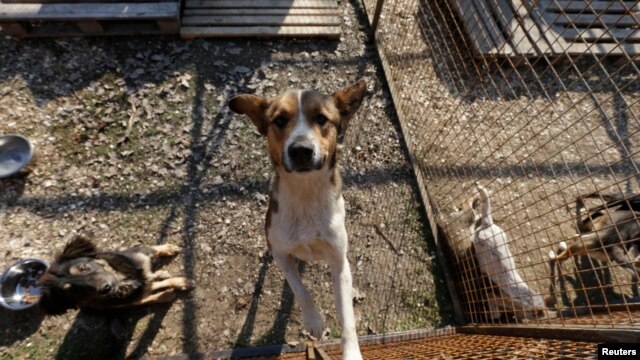Russians, Americans Use Internet to Save Sochi’s Stray Dogs
SOCHI, RUSSIA — Stray dogs are a common sight in Sochi, the Winter Olympics host city.
They are everywhere - begging for food at outdoor restaurants and foraging for food in back yards.
Who let the dogs out?
In recent weeks, an army of 100,000 construction workers went home, but they left behind hundreds of pets and guard dogs.
Nadezhda Maiboroda, who runs PovoDog, a new dog shelter here, said, “All Olympic projects are finished. Builders have gone home. But the dogs [are] still there.
"Really, we have [a] mild climate; for [a] dog to live on the street [is] not a big problem because food is everywhere,” she said of Sochi, a semi-tropical city.
Animal defenders complain that Sochi became the stage for dognapping. In October, the city signed a contract with a company to capture and kill 2,000 stray animals.
“The way the city decided is not helpful - some private company taking dogs from the streets, when there is actually no place to take them. So they just euthanize them,” said Maiboroda.
Fighting back through the Internet, Sochi animal lovers organized car ferries, taking dozens of stray dogs to safety with families in other parts of Russia.
Maiboroda built a dog shelter outside Sochi
Then, Oleg Deripaska, a billionaire dog lover, stepped in to rebuild and fund the shelter. It now houses over 100 dogs.
Sochi’s PovoDog shelter's new Facebook page - asking users, “Do you want to adopt a dog?” - is getting heavy traffic.
Through the Internet, dozens of international adoption requests have come in - 90 percent from the United States.
One American Olympic athlete in Sochi, slopestyle skiing silver medalist Gus Kenworthy, tweeted two photos of Sochi dogs he plans to bring home to friends in Colorado.
At last count, the photo of Kenworthy holding four puppies had been re-tweeted 4,000 times.
Through the Internet, Russians and Americans are pitching in to save the stray dogs of Sochi.
They are everywhere - begging for food at outdoor restaurants and foraging for food in back yards.
Who let the dogs out?
In recent weeks, an army of 100,000 construction workers went home, but they left behind hundreds of pets and guard dogs.
Nadezhda Maiboroda, who runs PovoDog, a new dog shelter here, said, “All Olympic projects are finished. Builders have gone home. But the dogs [are] still there.
"Really, we have [a] mild climate; for [a] dog to live on the street [is] not a big problem because food is everywhere,” she said of Sochi, a semi-tropical city.
Animal defenders complain that Sochi became the stage for dognapping. In October, the city signed a contract with a company to capture and kill 2,000 stray animals.
“The way the city decided is not helpful - some private company taking dogs from the streets, when there is actually no place to take them. So they just euthanize them,” said Maiboroda.
Fighting back through the Internet, Sochi animal lovers organized car ferries, taking dozens of stray dogs to safety with families in other parts of Russia.
Maiboroda built a dog shelter outside Sochi
Then, Oleg Deripaska, a billionaire dog lover, stepped in to rebuild and fund the shelter. It now houses over 100 dogs.
Sochi’s PovoDog shelter's new Facebook page - asking users, “Do you want to adopt a dog?” - is getting heavy traffic.
Through the Internet, dozens of international adoption requests have come in - 90 percent from the United States.
One American Olympic athlete in Sochi, slopestyle skiing silver medalist Gus Kenworthy, tweeted two photos of Sochi dogs he plans to bring home to friends in Colorado.
At last count, the photo of Kenworthy holding four puppies had been re-tweeted 4,000 times.
Through the Internet, Russians and Americans are pitching in to save the stray dogs of Sochi.


No comments:
Post a Comment